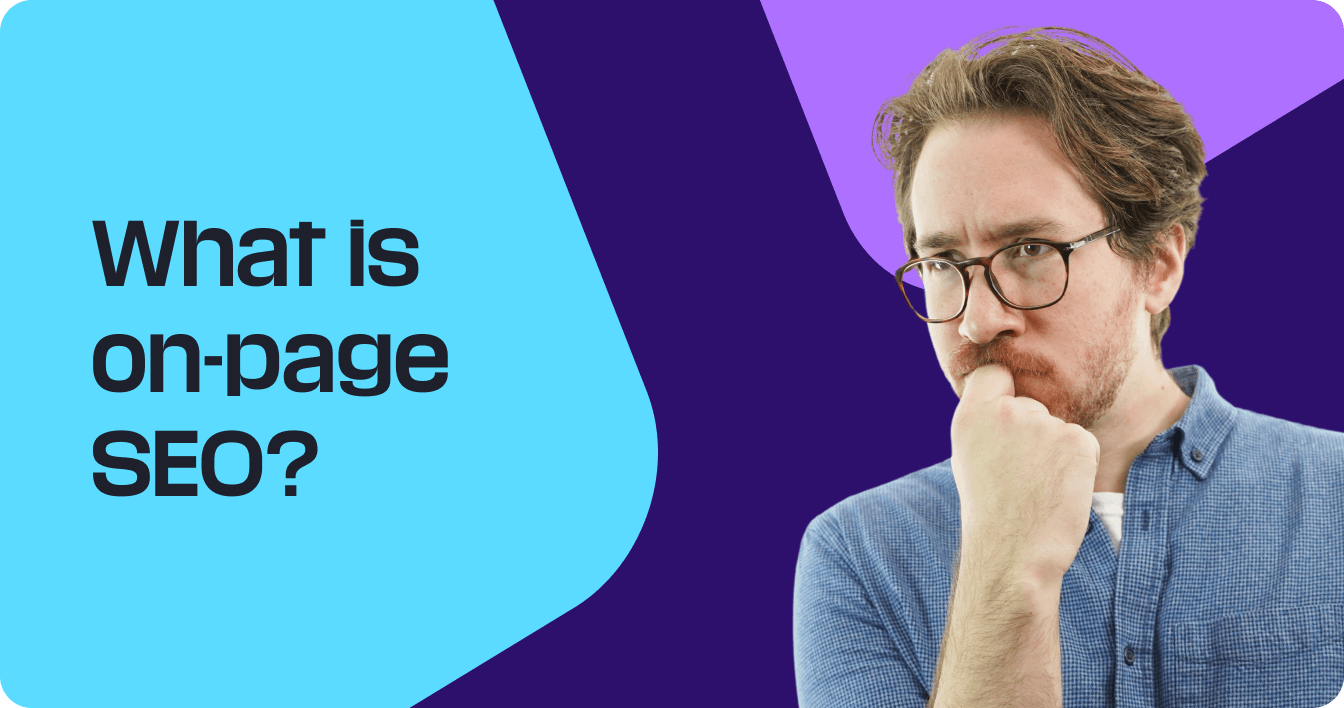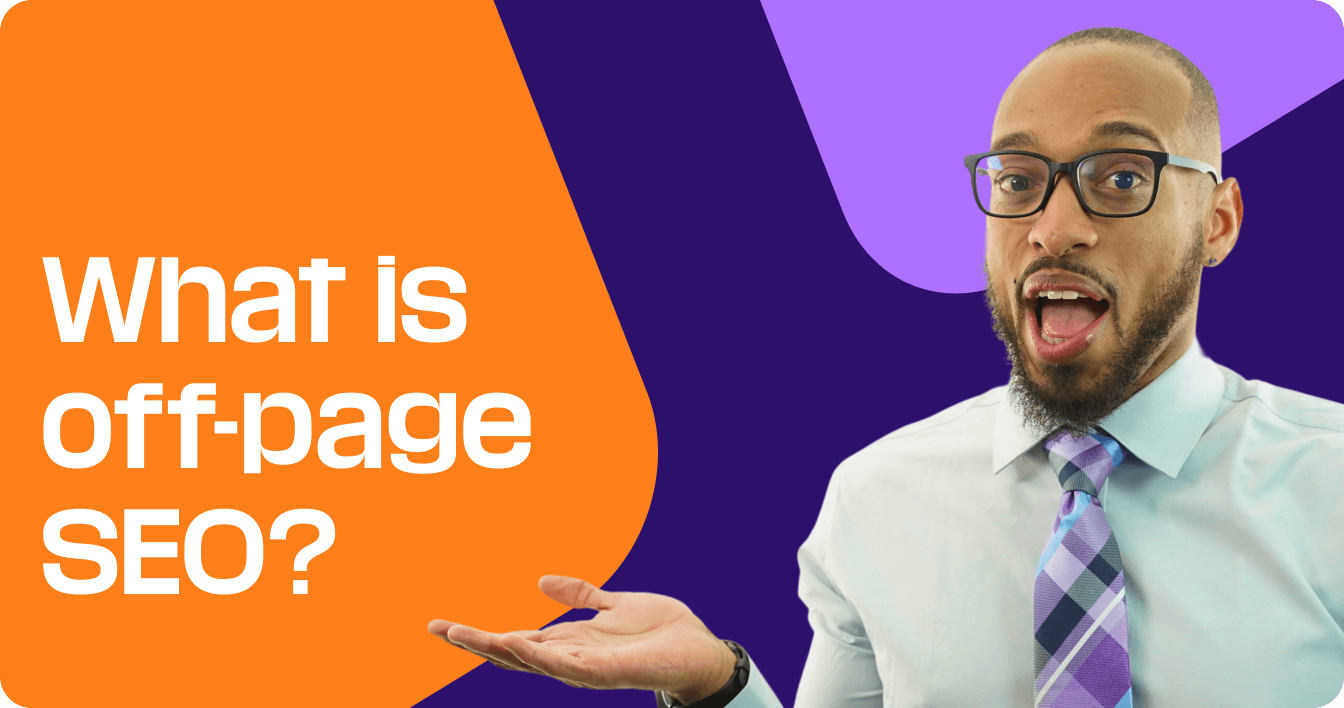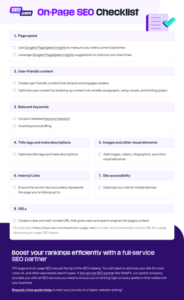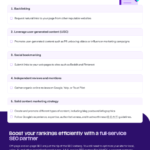On-page and off-page SEO techniques can help your website rank higher on search engines, making it more discoverable to users. In this guide, we’ll dive into the main differences between on-page and off-page SEO.
On-page vs. off-page SEO: Key differences
On-page and off-page SEO are essential SEO tactics every business should incorporate into its digital marketing strategy.
While on-page SEO focuses on changing your website, off-page SEO focuses on optimizing elements outside your website, especially what is said about your brand.
Combining the two ensures your brand messaging is aligned and streamlines your marketing efforts to enhance online visibility and boost search engine rankings. Whereas on-page optimization seeks to improve user experience on a site, off-page optimization’s main purpose is to build your domain authority and brand reputation on the web.
Here’s a table highlighting their main differences:
| On-Page SEO | Off-Page SEO |
| On-page SEO focuses on optimizing elements on your website and individual web pages, like:
|
Off-page SEO focuses on optimizing elements outside your website, including:
|
What is on-page SEO?
On-page SEO or on-site SEO is optimizing web pages on your business website to improve search engine rankings. It focuses on making changes to client-facing website resources on the website and HTML source code like content, site accessibility, and page speed. On-site optimizations ensure search engines understand what your website is about and your offerings.
Why is on-page SEO important?
On-page site optimization seeks to provide users with a helpful search experience that makes you a reliable resource for your audience. Implementing a successful on-page SEO strategy stands to benefit your business in many ways, among them:
- Improved online search ranking
- More organic traffic to your website
- Improved online visibility and awareness
- More leads and lasting client relationships
- Higher conversions and sales
How to do on-page SEO
An on-page SEO strategy considers key elements and focuses on improving these to meet user needs. These elements include:
- Page speed: Users want to access information within three seconds of clicking on a link or opening a website. Use Google’s PageSpeed insights to measure your site’s current load times, and then leverage its suggestions to improve your load times.
- User-friendly content: Create user-friendly content that attracts and engages readers, pushing them down the conversion funnel. You can optimize user content by breaking up content into smaller paragraphs, using visuals, and limiting jargon.
- Relevant keywords: Integrating more keywords in your content helps it appear higher on relevant search engine results pages (SERPs). Consider conducting detailed keyword research and avoid keyword stuffing.
- Title tags and meta descriptions: Optimizing title tags and meta descriptions helps determine if your listings are relevant to your search queries. It might not directly affect your listings, but it encourages people to click on your page, improving traffic and conversions.
- Images and other visual elements: To create an immersive and engaging site experience, you must add images, videos, infographics, and other visual elements to your pages. This breaks up continuous blocks of text and offers a more engaging visitor experience.
- Internal links: They provide a blueprint of your site’s web pages, allowing search engines to crawl and index your pages and keep visitors on the site longer. Always ensure the anchor text accurately represents the page you’re linking out to.
- Site accessibility: You want your site visitors to be able to access your pages from mobile devices, such as smartphones and tablets. This is essential because 70% of people access the Internet from their mobile devices.
- URLs: On-page SEO involves creating a clear and well-worded URL that gives users and search engines the page’s context, helping them better understand your business. For example, https://www.seo.com/basics/on-page-seo/ is a clear and contextually correct URL for a page discussing on-page SEO basics.
Free On-Page SEO Checklist
🚀 Kickstart your on-page optimization with our free guide
What is off-page SEO?
Off-page SEO refers to all your efforts in acquiring external resources that help you rank higher in search engines and gain domain authority. The most popular example of off-page SEO is link building, which involves getting other websites to link back to your website.
Why is off-page SEO important?
There’s a lot you stand to gain from a successful off-page SEO campaign. The main goal of off-page SEO is to build authority, credibility, and relevance. It ensures that your website is not only discoverable but also considered reputable.
Other notable benefits of off-page SEO include:
- Measure and report search relevance
- Earn higher search engine rankings
- Ensures site visitors are shown the most relevant and reliable answers
- Act as endorsements to your website’s quality
- Provides long-term results and a positive return on investment (ROI)
Key elements of off-page SEO
When implementing off-page SEO, here’s what you’ll need to focus on:
- Backlinking: It involves requesting natural links to your page from other reputable websites to boost your website’s relevance, authority, and trustworthiness. Guest blogging and promoting your content on social media are some ways you can earn more backlinks.
- Leverage user-generated content (UGC): Promoting user-generated content such as PR unboxing videos or influencer marketing campaigns to drive leads and conversions. UGC helps establish search engines and site visitors.
- Social bookmarking: This involves submitting links to your web pages to sites such as Reddit and Pinterest that appeal to customers in specific demographics and content niches. Search engines crawl these sites often, which can help your pages get discovered and indexed sooner.
- Independent reviews and mentions: Gathering organic online reviews on Google, Yelp, or Trust Pilot provides social proof to customers and influences purchasing decisions. Avoid incentivizing website reviews in order to safeguard your positive reputation.
- Solid content marketing strategy: It involves creating and promoting different types of content, including blog posts and infographics, and following Google’s experience, expertise, authoritativeness, and trustworthiness (E-E-A-T) guidelines.
Free Off-Page SEO Checklist
🚀 Kickstart your off-page optimization with our free guide
Boost your rankings efficiently with a full-service SEO partner
Off-page and on-page SEO are just the tip of the SEO iceberg. You still need to optimize your site for local, voice, AI, and other specialized search types. A full-service SEO partner like WebFX, our parent company, provides you with all SEO services you need to ensure you’re ranking high on every platform that matters for your business.
We have 500+ with specialized SEO knowledge. Our on-page SEO services are tailored to your needs and will help you increase revenue for your business.
Request a free quote today to start your journey to a higher website ranking!
Let’s Drive Results Together 

Don’t fail your website’s most important test
Get an SEO scorecard of your website for free in less than 30 seconds.
Don’t fail your website’s most important test
Get an SEO scorecard of your website for free in less than 30 seconds.
What to read next
- Feb 27, 2026
- 3 min. read
- Feb 19, 2026
- 8 min. read







